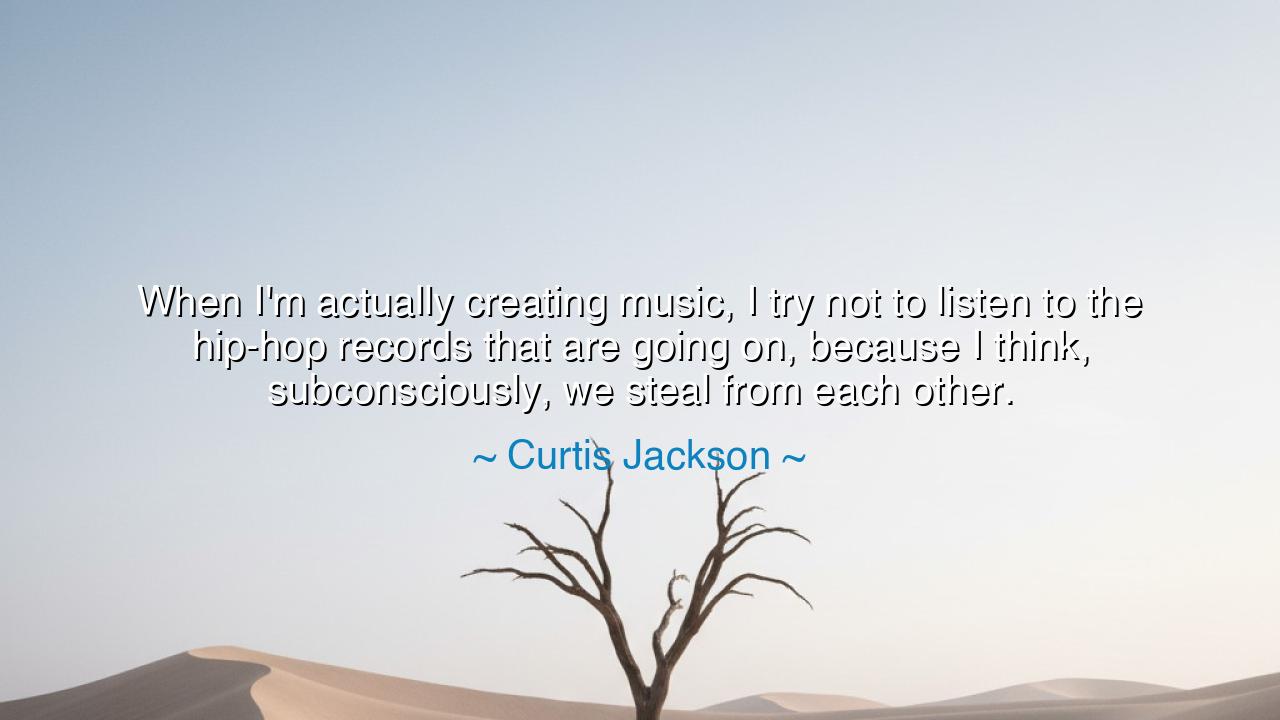
When I'm actually creating music, I try not to listen to the
When I'm actually creating music, I try not to listen to the hip-hop records that are going on, because I think, subconsciously, we steal from each other.






The warrior of rhythm and word, Curtis Jackson, known to the world as 50 Cent, once spoke these words of caution and wisdom: “When I'm actually creating music, I try not to listen to the hip-hop records that are going on, because I think, subconsciously, we steal from each other.” In this confession, he unveils the hidden struggle of every creator—the battle between imitation and originality. For it is easy to echo the voices of others, but far harder to listen to the silence of one’s own soul and summon a voice that is truly unique.
The ancients knew this truth well. The philosopher Plato warned that artists must beware of mere imitation, for the world needs not endless mirrors but sparks of the divine. Likewise, the prophets and poets of every age have known the danger of being drowned in the voices of others. To create something eternal, one must dare to step into solitude, cutting off the noise, so that the still, small voice of inspiration can rise. Jackson’s words echo this age-old wisdom: guard your creativity, for it is a treasure easily clouded by repetition.
Consider the story of Isaac Newton, who in his solitude under an apple tree glimpsed the laws of gravity. He did not discover by repeating others but by observing with his own eyes, thinking with his own mind. Or recall Mozart, whose genius flowed not because he copied his peers, but because he heard melodies where others heard silence. These figures remind us that the greatest works come not from imitation, but from guarding the purity of thought and expression, allowing the individual spirit to shine.
Jackson’s warning is especially poignant in the realm of hip-hop, a culture rooted in originality, authenticity, and voice. To sound like another is to lose the essence of the craft. Yet the temptation is great: surrounded by popular beats and verses, the mind absorbs and repeats without knowing it. His discipline—to step away, to refuse the constant stream of influence—is an act of courage. It is the warrior closing the gates of the city, so that what is forged within comes not from outside invaders, but from his own fire.
The deeper meaning is this: all true creation requires solitude. A painter must sometimes put down the works of others to see the colors anew. A writer must turn from books to face the blank page. A leader must quiet the noise of advisors to hear the whisper of conscience. Without this sacred withdrawal, we risk becoming echoes instead of voices, shadows instead of lights.
For us, the lesson is clear: if you would create, or even if you would simply live with authenticity, protect your individuality. Do not be afraid to step away from the crowd, to silence the voices of others, and to listen to the deeper music within. Inspiration will come, not from imitation, but from the well of your own experience, your own struggle, your own triumphs and pains.
Practically, this means carving out time free from the constant noise—time without music, without chatter, without distraction. It means daring to create before you consume, to give before you borrow. It means cultivating the discipline to say: “This voice, this work, this life must be mine.” For though we are all shaped by the world around us, greatness comes from transforming influence into originality, and not from becoming a mere echo.
Thus, let Curtis Jackson’s words be remembered: guard your art from imitation, guard your soul from noise. Create not as an echo, but as a flame. For the world does not need another copy—it needs your voice, your vision, your truth, spoken boldly into the silence.






AAdministratorAdministrator
Welcome, honored guests. Please leave a comment, we will respond soon